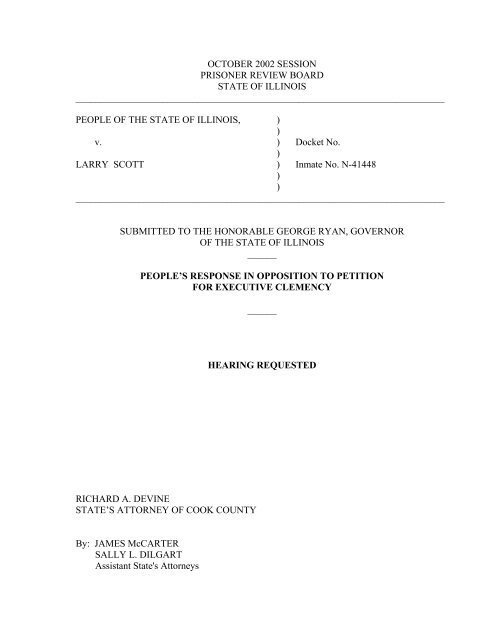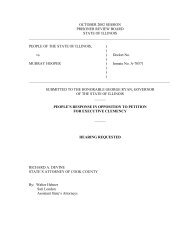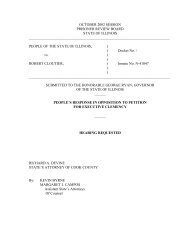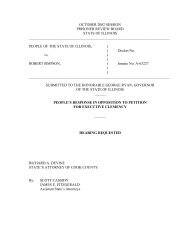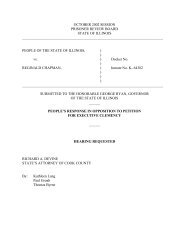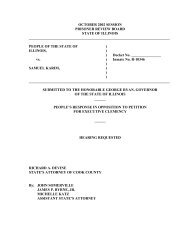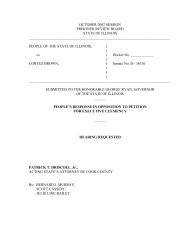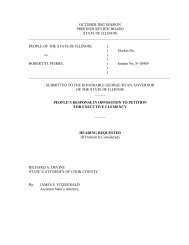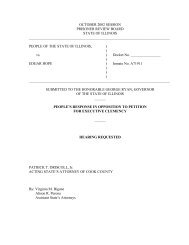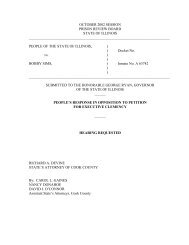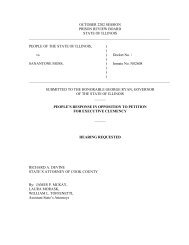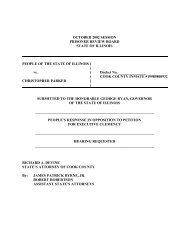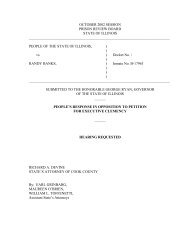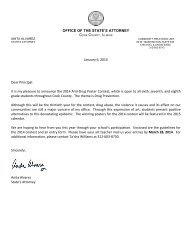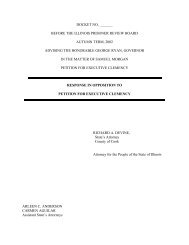Larry Scott - Cook County State's Attorney
Larry Scott - Cook County State's Attorney
Larry Scott - Cook County State's Attorney
Create successful ePaper yourself
Turn your PDF publications into a flip-book with our unique Google optimized e-Paper software.
OCTOBER 2002 SESSION<br />
PRISONER REVIEW BOARD<br />
STATE OF ILLINOIS<br />
____________________________________________________________________________<br />
PEOPLE OF THE STATE OF ILLINOIS, )<br />
v.<br />
)<br />
) Docket No.<br />
LARRY SCOTT<br />
)<br />
) Inmate No. N-41448<br />
)<br />
)<br />
____________________________________________________________________________<br />
SUBMITTED TO THE HONORABLE GEORGE RYAN, GOVERNOR<br />
OF THE STATE OF ILLINOIS<br />
______<br />
PEOPLE’S RESPONSE IN OPPOSITION TO PETITION<br />
FOR EXECUTIVE CLEMENCY<br />
______<br />
HEARING REQUESTED<br />
RICHARD A. DEVINE<br />
STATE’S ATTORNEY OF COOK COUNTY<br />
By: JAMES McCARTER<br />
SALLY L. DILGART<br />
Assistant <strong>State's</strong> <strong>Attorney</strong>s
OCTOBER 2002 SESSION<br />
PRISONER REVIEW BOARD<br />
STATE OF ILLINOIS<br />
____________________________________________________________________________<br />
PEOPLE OF THE STATE OF ILLINOIS,<br />
vs.<br />
LARRY SCOTT,<br />
)<br />
) Docket No.<br />
)<br />
) Inmate No. N-41448<br />
)<br />
)<br />
)<br />
____________________________________________________________________________<br />
I.<br />
HISTORY OF THE CASE<br />
On August 4, 1984, <strong>Larry</strong> <strong>Scott</strong> ["Petitioner"] stalked a Moody Bible Institute student<br />
named Kristen Kent as she walked down the street in the area called the "Gold Coast" in<br />
Chicago, Illinois. Kristin was walking home from work and listening to music on her Sony<br />
Walkman headphones. Petitioner put his arm around her, pulled her into a driveway, and<br />
demanded money. When his robbery attempt was unsuccessful, Petitioner strangled and raped<br />
Kristen, and he mutilated her body by biting her vagina and biting off the nipples on her breasts.<br />
The jury found Petitioner guilty of murder and attempted robbery and returned a verdict<br />
of guilty but mentally ill for aggravated criminal sexual assault. Petitioner then elected a bench<br />
sentencing hearing conducted by Judge Earl E. Strayhorn. The judge found Petitioner eligible<br />
for the death penalty under 720 ILCS 5/9-1(b)(6), for a murder committed during the course of<br />
the felony of aggravated criminal sexual assault. The State presented additional evidence in<br />
aggravation, whereas the defense chose to rely on mitigating aspects of the evidence received at<br />
trial, particularly conflicting evidence about Petitioner's mental health. On May 30, 1986, Judge<br />
1
Strayhorn decided there were no mitigating factors sufficient to preclude the death penalty, and<br />
he sentenced Petitioner to death for the murder of Kristen Kent. He also imposed a 30 year term<br />
of imprisonment for the aggravated criminal sexual assault.<br />
The Illinois Supreme Court affirmed Petitioner's convictions and sentence on direct<br />
appeal, see People v. <strong>Scott</strong>, 148 Ill. 2d 479 (1992), and the United States Supreme Court refused<br />
to hear his case. Petitioner then returned to the circuit court where Judge Strayhorn denied his<br />
post-conviction petition in 1997. The Illinois Supreme Court affirmed petition dismissal in<br />
People v. <strong>Scott</strong>, 194 Ill. 2d 268 (2000). Petitioner currently has a habeas petition pending before<br />
Judge Marvin Aspen of the United States District Court in <strong>Scott</strong> v. Schomig, No. 02 C 0631.<br />
2
II.<br />
FACTS OF THE CASE<br />
The <strong>State's</strong> Case-In-Chief<br />
Petitioner Rapes And Strangles Kristen Kent<br />
At approximately 9:00 p.m. on August 4, 1984, a Moody Bible Institute student named<br />
Kristen Kent - who witnesses described as "very polite, very quiet, and very intelligent" - was<br />
walking down the street, listening to music on her Sony Walkman headphones, as she headed<br />
home from her job at the East Bank Club. (R. 443). 1<br />
<strong>Larry</strong> <strong>Scott</strong> ["Petitioner"] was standing in<br />
the dark, recessed area of a building doorway when he saw her. Petitioner followed her down<br />
the street and stalked her until they came to a driveway on Wells Street in Chicago. Petitioner<br />
"put his arm around her" and demanded money, he later recalled. (R. 603).<br />
When his robbery<br />
attempt was unsuccessful, Petitioner pulled her into the driveway and took her to an area off the<br />
street near a garage. He again demanded money and struck her. He also strangled and raped her<br />
and mutilated her body by biting the nipples off her breasts before dragging Kristen's body to a<br />
more secluded area to conceal it from pedestrians on the street.<br />
Kristen's body was found two days later in a doorway in a dark and concealed area behind<br />
711 N. Wells Street. Kristen had been dragged for a considerable distance across a parking lot.<br />
Kristen had abrasions, contusions, and lacerations on her eyes and nose consistent with being<br />
struck by a fist. Her scalp, chin, throat, face, elbows, back, legs, wrist, and shoulder contained<br />
additional abrasions or bruises. Marks on her neck were consistent with fingernail marks. The<br />
nipple of her left breast was missing, and the nipple of her right breast had been partially<br />
amputated. A forensic odontologist later examined the marks on Kristen's body and concluded<br />
that Petitioner's dentition was "entirely consistent" with the marks found in the area of the<br />
1<br />
References designated "R." are to the record of proceedings presently on file with the Illinois Supreme Court.<br />
3
victim's nipples. Marks compatible with teeth marks were found on her vagina. Kristen had<br />
been raped, bitten, and strangled.<br />
Petitioner Stalks Sarah Buchsbaum Minutes Before<br />
He Rapes And Murders Kristen<br />
Sarah Buchsbaum testified at trial and identified Petitioner as the man who had followed<br />
her, too - from Water Tower Place to her car parked on front of the Moody Bible Institute -<br />
during the evening of August 4. Sarah took several evasive steps in an effort to shake him, but<br />
Petitioner continued to follow her. By the time she reached Clark Street, there were no other<br />
people on the street. Sarah finally ran into the lobby of an apartment building which she knew<br />
was attended by a doorman. Petitioner continued to watch Sarah for awhile before he finally<br />
walked away. When last seen, Petitioner was walking west on Chicago Avenue toward Wells<br />
Street. Sarah waited a few minutes and finally arrived at her car at 8:53 p.m. When she later<br />
read about Kristen's murder, Sarah contacted the police and gave them a physical description of<br />
Petitioner. Petitioner had been wearing a "loud plaid suit" with a herringbone background at the<br />
time he followed her. (R. 449).<br />
Police Officers Arrest Petitioner After Watching Him Stalk A Third Woman<br />
During the early evening hours of August 7, police officers on routine patrol in the 600<br />
block of North Wells saw a woman (whose name was never given) walking north on Wells.<br />
Petitioner, wearing the same plaid herringbone suit, was following quickly behind her. When<br />
Petitioner saw the police officers, he slowed his pace to allow a greater distance between himself<br />
and the woman. But the police passed Petitioner, made a U-turn and approached Petitioner from<br />
behind. At that time, the officers noticed that Petitioner was walking up quickly behind the<br />
woman. Petitioner noticed the police and again slowed his pace. The police passed Petitioner,<br />
went around the block and approached Petitioner a third time. Petitioner was again walking<br />
4
quickly behind the woman, until he saw the police. This time Petitioner turned to walk south on<br />
Wells in the opposite direction of the woman. The police made another U-turn, and, as they<br />
approached him, Petitioner turned and walked towards an “El” station.<br />
Petitioner's Arrest And Reaction To A News Account Of Kristen's Murder<br />
The officers got out of their squad car, ordered Petitioner to stop, and asked him for<br />
identification. Petitioner gave them a number of papers inside a newspaper clipping. As one of<br />
the officers began to open the clipping, Petitioner pushed him and hollered "I'm going to kill<br />
you". (R. 527). The officers subdued Petitioner and placed him in handcuffs. One of the<br />
officers then opened the clipping and noticed it was a newspaper article about Kristen's murder.<br />
Petitioner screamed “That pussy bitch. That pussy bitch. I’m tired of hearing about her.” (R.<br />
508, 528). The officers arrested Petitioner and transported him to police headquarters where he<br />
was read his Miranda rights several times. Petitioner said he understood his rights.<br />
Petitioner's Recounts The Rape And Murder To A Cell Mate<br />
Clifton "Goatee" Wright shared a holding cell with Petitioner after Wright was arrested<br />
for non-payment of his El fare.<br />
As Petitioner stood in the cell masturbating, he told Wright that<br />
he had been arrested for the murder of the "girl from the newspaper article." Wright knocked on<br />
the door and asked to be released because he did not want to share a cell with Petitioner. (R.<br />
535).<br />
Petitioner Tries To Deny The Murder<br />
When questioned by the police officers, Petitioner initially denied any knowledge of<br />
Kristen's murder other than the information contained in the newspaper article. He said he'd kept<br />
the article because he planned to write a book about Kristen's murder exclusively from<br />
newspaper accounts. He denied following any woman. When confronted with Sarah's report,<br />
5
however, Petitioner changed his story and admitted following a woman [Sarah] in the<br />
neighborhood of Kristen's murder. Petitioner also admitted following another woman [Kristen]<br />
but he denied grabbing or attacking her.<br />
Petitioner Admits Trying To Rob Kristen<br />
Some time later, police officers interviewed Petitioner again after giving him fresh<br />
Miranda warnings. This time, Petitioner admitted he had been standing in a recessed entrance to<br />
a building on Wells Street when he first saw Kristen. He began to follow her. He put his arm<br />
around her and demanded money and pulled her into a driveway. When he asked her again for<br />
money, Kristen allegedly called Petitioner a name and he hit her in the face twice, he said. He<br />
bit her arm when she struggled to defend herself and he ran away and left her there, Petitioner<br />
concluded.<br />
Petitioner Admits He Raped Kristen<br />
In his third oral statement, preceded by fresh Miranda warnings, Petitioner initially<br />
admitted only that he had hit and tried to rob Kristen. After he was confronted with his<br />
admission to Goatee Wright, however, Petitioner admitted dragging Kristen through a parking lot<br />
to an alley where he said he had sexual intercourse with her for an hour. Petitioner admitted<br />
biting her breasts and vagina. He couldn't remember whether he had placed his hands around her<br />
neck, but he admitted he could have done so. Kristen wasn't moving, Petitioner said, but he<br />
thought she was still alive. He did not take anything from her, he concluded, but he wanted to<br />
hide her body.<br />
Petitioner Takes The Officers To The Scene Of The Murder<br />
During the evening of his interrogation, Petitioner accompanied police officers to Wells<br />
Street where he pointed out the recessed doorway where he had been standing when he first saw<br />
6
Kristen. He also showed the officers where he had stopped her, where he raped her, and where<br />
he left her body. Petitioner described the crimes in considerable detail and provided details<br />
which were corroborated by the physical evidence (the victim's belongings) in the case.<br />
Petitioner also took the officers to a beach where he had spent the night of August 4, and the<br />
officers recovered his shirt there.<br />
Petitioner's Written Confession<br />
Later that night, Petitioner talked to an assistant state's attorney and gave an oral<br />
statement which was later transcribed by a court reporter. A copy of that statement is appended<br />
to this Response as Exhibit A.<br />
In that statement, Petitioner stated that the police had not<br />
mistreated him. He also said he understood his Miranda rights. Petitioner initialed three<br />
corrections on the written statement after he pointed out an omitted word and a typographical<br />
error in transcription. The written and oral statements were identical with one exception. In the<br />
oral statement, Petitioner said he moved Kristen's body when he realized she might be "dead".<br />
In the written statement, Petitioner changed that word to "hurt". (R. 686).<br />
Petitioner described the initial struggle in the written statement:<br />
Q. When you went into the alley what were you thinking of doing?<br />
A. Just really getting the money.<br />
Q. After the struggle started what did you start thinking about then?<br />
A. Well, having sex, you know.<br />
Q. When the struggle started what did she do?<br />
A. Nothing but tried to keep me from, you know, she put her hand up<br />
in my face like that (indicating) and I bit her.<br />
Q. What did you do to her?<br />
A. I hit her a couple times and that was it.<br />
(R. 692). Petitioner then described the sexual assault and disposal of the victim's body:<br />
Q. When you were on the ground what happened?<br />
A. Let's see, I took her clothes off.<br />
Q. How did you take her clothes off?<br />
7
A. Just pulled down her pants. That is all.<br />
Q. What about he top?<br />
A. Pulled it up.<br />
. . .<br />
A. After you pushed her clothes like this what did you do?<br />
Q. Well, I unzipped my pants, you know, and we had sex.<br />
A. Did you do anything while you were having sex with her?<br />
Q. No.<br />
Q. Did your penis enter her vagina?<br />
A. Yeah.<br />
Q. Did you penetrate her?<br />
A. Yeah.<br />
Q. What about her breasts?<br />
A. Yeah.<br />
Q. What about them, though?<br />
A. What do you mean? I didn't do nothing but, you know, just the<br />
normal, you know.<br />
Q. By 'normal' did you leave any bite marks on her?<br />
A. I could. Yeah.<br />
Q. About her breasts?<br />
A. Yeah.<br />
Q. <strong>Larry</strong>, earlier didn't you tell us you bit her nipple?<br />
A. Yeah.<br />
Q. Is that true?<br />
A. Yeah.<br />
. . .<br />
Q. After you had sex with her did you have any other type of sex with her?<br />
A. Oral sex.<br />
Q. What did you do to have oral sex?<br />
A. Just, you know, put my head between her legs and licked her all over, bit her.<br />
Q. During all this time do you remember her screaming at all?<br />
A. No.<br />
Q. During this time that you were having sex with her, both vaginally and orally, do<br />
you remember her saying anything to you?<br />
A. No.<br />
Q. Did she say anything to you?<br />
A. Just, just that from the beginning, a little black nigger. That was about it.<br />
Q. About how long did you have sex with her?<br />
A. About an hour.<br />
Q. After that what did you start to think?<br />
8
A. Maybe I better, you know, get her from right there, you know before somebody sees<br />
her.<br />
Q. Did you see her move at all?<br />
A. Seemed like she was breathing and everything.<br />
Q. But did she move?<br />
A. No. I picked her up and carried her.<br />
. . .<br />
Q. When you picked her up did she move at all?<br />
A. No.<br />
Q. Did she say anything at all then?<br />
A. No.<br />
Q. When you put her down at the other spot did she say anything?<br />
A. No.<br />
Q. Was she moving at all?<br />
A. No.<br />
Q. What did you start to think then?<br />
A. Just leave.<br />
Q. Why?<br />
A. Because, maybe, you know, she could be hurt, you know.<br />
. . .<br />
(R. 693-98).<br />
Q. When you were having sex with the girl was she conscious or awake?<br />
A. No.<br />
Q. Do you ever remember her regaining consciousness?<br />
A. No.<br />
Q. When you carried her she was not awake either?<br />
A. No.<br />
Additional Physical Evidence<br />
The jacket seized from Petitioner at the time of his arrest contained type O blood<br />
consistent with Kristen's blood type. Spermatozoa found in the victim's body corroborated<br />
Petitioner's admission of sexual intercourse.<br />
The Defense Case<br />
Defense counsel raised the affirmative defense of insanity at trial. Petitioner's ability to<br />
appreciate the criminality of his conduct was never an issue in the case, however. Petitioner<br />
9
unquestionably knew the difference between right and wrong. The only issue at trial was<br />
Petitioner's ability to conform his conduct to the requirements of the law - that is, to control his<br />
actions.<br />
Three (3) mental health professionals testified for the defense and said that Petitioner is<br />
schizophrenic. These witnesses based their conclusions, in part, on medical records from which<br />
they theorized that Petitioner's mental illness had prompted various hospital stays. Petitioner<br />
himself admitted, however, that he was hospitalized for drug abuse. Moreover, the defense<br />
witnesses agreed that a person can be schizophrenic and still be sane. Schizophrenics can<br />
sometimes conform their conduct to the requirements of the law, they testified. The defense<br />
experts also acknowledged that Petitioner acted purposefully on the night of Kristen's murder,<br />
and the manner in which he concealed her body proved that he had an ability to control his<br />
behavior.<br />
According to the defense witnesses, Petitioner is not utterly incapable of controlling his<br />
actions. Although he lacked "inner" controls, the experts said, Petitioner could respond to<br />
"external" controls, and he was fully capable of modifying his behavior as needed. (R. 727-28).<br />
Petitioner was able to control his actions when police officers (or the apartment doorman) were<br />
present. The experts then asked the jury to believe that Petitioner was insane, that is that he was<br />
unable to control his behavior, only when he was left alone with a woman.<br />
Rebuttal Testimony<br />
Two psychiatrists examined Petitioner and concluded he is not schizophrenic. Petitioner<br />
was sane when he raped and murdered Kristen, they concluded. Petitioner knew the difference<br />
between right and wrong and "he thought he could get away with it". (R. 982). According to<br />
the States witnesses, Petitioner is a sexual sadist who has an anti-social personality disorder.<br />
10
Disorders such as these are often manifested in drug and alcohol abuse, theft, and rape. The<br />
rebuttal witnesses further stated there is no medical distinction between "inner" and "outer"<br />
controls. Petitioner's behavior when following the women, his ability to alter that behavior when<br />
he saw police officers, his choice of a secluded location for committing the crimes, and his<br />
concealment of Kristen's body all demonstrated his ability to control his behavior and his sanity.<br />
Surrebuttal Testimony<br />
The defense then called 2 mental health professionals to testify, and they offered a<br />
number of different and conflicting diagnoses. One of the witnesses admitted an inconsistency<br />
within his own diagnoses and testified "I made a mistake". (R. 1053).<br />
The Capital Sentencing Hearing<br />
The Eligibility Phase<br />
After the parties stipulated to all the evidence adduced at trial, the judge found Petitioner<br />
was eligible for the death penalty because he had intentionally murdered Kristen while<br />
committing an aggravated criminal sexual assault.<br />
Evidence in Aggravation<br />
Petitioner' Stalks A Woman in 1979<br />
In August of 1979, a woman named Margaret was walking to her job at a day care center<br />
when Petitioner began following her. Petitioner walked away when she looked at him, but he<br />
followed her again. When Margaret accelerated her pace, Petitioner did the same.<br />
When<br />
Margaret took a shortcut across a parking lot, Petitioner followed her. When Margaret ran,<br />
Petitioner ran. When Margaret arrived at the day care center, only to discover it was locked,<br />
Petitioner came up to her and took her wallet. He also placed some sort of object in her back and<br />
threatened to kill her if she screamed. While Margaret was pleading with him, Petitioner led her<br />
11
to an abandoned building where he again threatened to kill her. A minister arrived at this time<br />
and asked Margaret if Petitioner was bothering her. Petitioner claimed he'd only asked for car<br />
fare. The minister made Petitioner return Margaret's wallet and chased him away. Petitioner<br />
was convicted of theft from person and sentenced to serve 18 months probation.<br />
Petitioner's 1983 Unlawful Restraint And Sexual Assault<br />
A Chicago fireman testified that he saw Petitioner sexually assaulting a woman named<br />
Helen in a park near E. Chicago Avenue around 4:00 a.m. on July 21, 1983.<br />
Helen was<br />
crouched on all fours, with her face pushed against a fence, while Petitioner stood behind her<br />
having sexual intercourse with her. The fireman could hear Helen moan "please, please don't<br />
hurt me. Don't kill me".<br />
(R. 1194-98). The fireman called police officers who arrived and<br />
promptly arrested Petitioner. Petitioner was convicted of unlawful restraint and received a 1 year<br />
sentence with credit for time served.<br />
Petitioner's 1984 Prison Fight<br />
In December of 1984, Petitioner was involved in a fight with prison guards, and one of<br />
the guard was hit. Petitioner was placed in segregation for 29 days.<br />
Mitigating Evidence<br />
Instead of offering additional evidence, defense counsel chose to rely on the mitigating<br />
aspects of the evidence received at trial, particularly the conflicting evidence about his mental<br />
illness.<br />
Victim Impact Testimony<br />
The victim's mother, Carolyn Kent, then presented an oral statement about the effect that<br />
Kristen's death has had on her family. She stated her family has been very depressed, and<br />
various family members have had a difficult time associating with others after Kristen's murder.<br />
12
The judge decided there were no mitigating circumstances sufficient to preclude<br />
imposition of the death penalty, and he accordingly sentenced Petitioner to death for the murder<br />
of Kristen Kent.<br />
The Post-Conviction Hearing<br />
As noted above, Petitioner sought post-conviction relief in the Illinois courts, and Judge<br />
Strayhorn was again assigned to the case. In his petition, <strong>Scott</strong> raised 25 claims for relief. After<br />
examining the petition and the supporting affidavits, Judge Strayhorn denied counsel’s request<br />
for an evidentiary hearing for all of the claims, with the exception of the claim in which<br />
Petitioner had alleged he was denied the effective assistance of counsel when his trial attorneys<br />
did not permit him to plead guilty and present evidence of remorse at sentencing. In essence,<br />
Petitioner asked Judge Strayhorn to re-evaluate the sentencing decision he had made 11 years<br />
before in light of newly-presented evidence of remorse.<br />
The judge then held a hearing at which Petitioner testified and described his feelings<br />
about the crimes he had committed. His feelings of remorse were, at best, lukewarm. Petitioner<br />
did not say he was sorry he had raped and murdered Kristen. Nor did he express any sympathy<br />
for the victim’s family. Instead, Petitioner tended to express his fatalistic belief that, because he<br />
had taken Kristen’s life, it was now time for him, perforce, to forfeit his own:<br />
Q. How did you then feel [during the trial proceedings] about what<br />
you did? Whether it was right or wrong, how did you feel about it?<br />
A. I feeled (sic) like it was wrong.<br />
Q. How do you feel about it today?<br />
A. That it was wrong.<br />
13
Q. Do you feel that it was wrong just for you or wrong for the lady you killed and her<br />
family? Do you have any remorse? Did you have any remorse then? What do<br />
you feel?<br />
A. I feel the same way I did, that it was wrong.<br />
Q. How wrong was it?<br />
Q. It was wrong enough to get the death sentence.<br />
(PC Supp. R. I-5 to I-6). The psychiatrists who examined <strong>Scott</strong> to determine his fitness for trial<br />
reported that he had made similar statements to them, as well. “He stated that he knows he<br />
committed the crime, that he feels bad about it, and [he] stated that no amount of money could<br />
replace the girl’s life, so that by taking the death penalty it would ‘make it even’”. (Blumstein<br />
report).<br />
This lukewarm expression of remorse was not enough to outweigh Petitioner's long criminal<br />
record and the facts of this case. Judge Strayhorn stated that he still believed the death penalty was<br />
the only appropriate sentence for Petitioner. In a remarkably moving passage, the judge described<br />
the reasons for his decision:<br />
Fifteen years after this event happened, when I was reading this file here this<br />
morning to refresh my recollection as to the facts, my blood still runs cold<br />
with the cruelty and the heinousness and the inhumanity and the cannibalistic<br />
fervor that was exhibited by this man as he killed this woman, bit off both of<br />
her nipples, cannibalized her vagina orally.<br />
He wasn’t satisfied with killing her, he had to cannibalize her body. He<br />
desecrated, he had no feeling of this woman as a human being.<br />
So, no, I don’t have any feeling that what I did then was wrong and I don’t<br />
have any feeling that what I’m doing now is wrong, and I say for the record<br />
that the question of remorse, I accept it and I put it on the scale as I must, and<br />
it still doesn’t outweigh the heinous act that this man committed in taking that<br />
woman’s life.<br />
14
(PC R. L-11 to L-12). The Illinois Supreme Court agreed and affirmed Judge Strayhorn's decision<br />
to dismiss the post-conviction petition. <strong>Scott</strong>, 194 Ill. 2d at 276.<br />
15
I.<br />
REASONS FOR DENYING THE PETITION<br />
On August 4, 1984, just after leaving her part-time job at the East Bank Club, Kristen Kent was<br />
walking to her dormitory at the Moody Bible Institute. Witnesses said that Kristen was "very<br />
polite, very quiet, and very intelligent" - in short, a well-behaved girl who loved her parents, and<br />
who was loved by them. (R. 443). Kristin was walking down the street, enjoying the music on her<br />
Sony Walkman, when she stepped into the path of Petitioner <strong>Larry</strong> <strong>Scott</strong>, a sexual sadist who raped<br />
and strangled her after he unsuccessfully tried to rob her. Petitioner mutilated her body by biting<br />
her vagina and by biting the nipples off her breasts. We know this is true, because Petitioner later<br />
admitted it all to police officers and to an assistant state's attorney. He also recounted the incident<br />
to a cell mate while he engaged in an act of sexual gratification in a lockup cell.<br />
Petitioner Does Not Claim Actual Innocence<br />
It is important to note at the outset that Petitioner does not, and indeed cannot, claim he is<br />
innocent of the crimes for which he has been convicted. The evidence at Petitioner's trial, which<br />
included his corroborated confessions, was truly overwhelming, and Petitioner's counsel now<br />
concedes his client's guilt. (Pet. 3). Nor should this Board conclude that Petitioner feels any<br />
remorse whatsoever. As noted above, Petitioner said he knew his actions were wrong, but he never<br />
said that he was sorry for what he had done. The circuit court judge was able to hear Petitioner<br />
testify and judge his demeanor on the stand. After doing so, he rejected Petitioner's claim and<br />
reiterated that the death penalty is the appropriate penalty for this petitioner and these crimes.<br />
Seven (7) supreme court justices subsequently affirmed his decision. This Board should not<br />
overturn their findings now.<br />
16
Mental Retardation<br />
The real crux of Petitioner's petition concerns his intellectual abilities. Citing Atkins v.<br />
Virginia, 122 S. Ct. 2242 (2002), Petitioner urges this Board to recommend clemency because the<br />
imposition of the death sentence violates the Eighth Amendment’s prohibition against cruel and<br />
unusual punishment.<br />
But the Atkins court did not formulate a definition of "mental retardation" for this Board to use.<br />
The court did refer in passing to the definition adopted by the American Association of Mental<br />
Retardation (AAMR), which defines mental retardation as follows: "Mental retardation refers to<br />
substantial limitations in present functioning. It is characterized by significantly subaverage<br />
intellectual functioning, existing concurrently with related limitations in two or more of the<br />
following applicable adaptive skill areas: communication, self-care, home living, social skills,<br />
community use, self-direction, health and safety, functional academics, leisure, and work. Mental<br />
retardation manifests before age 18."<br />
Under this definition, "mild" retardation is typically<br />
manifested in an I.Q. of 55 to 70. Atkins, 122 S. Ct. at 2245, n.3.<br />
But the Supreme Court expressly stated that it was not adopting a definition of mental<br />
retardation, and the court left it to the various states to adopt a definition and to delineate<br />
procedures for determining whether or not a particular Petitioner is retarded. Id. at 2249-50.<br />
Because Illinois has not yet adopted a definition of mental retardation, nor has it crafted the<br />
appropriate procedures, Petitioner’s claim is premature and should not be considered by the Board<br />
at this time.<br />
Equally important, the evidence concerning Petitioner's mental abilities is conflicting, at best.<br />
Petitioner has now submitted a letter from a doctor who has concluded that additional testing<br />
might show that Petitioner is mentally retarded. (Pet. Exh. D at 2) ("reliable portions of the [pre-<br />
17
trial] testing did show that Mr. <strong>Scott</strong> 's (sic) had an I.Q. near retardation")(emphasis added). This<br />
doctor recommends additional testing "designed to show the status of a wide range of particular<br />
abilities", id., and the doctor estimates that all the additional testing and professional consultation<br />
he is recommending will cost $25,000. (Exh. D at 4).<br />
But the evidence adduced at trial points in exactly the opposite direction. Petitioner's mental<br />
state was extensively litigated at the fitness and suppression hearings, and again at trial - 8 mental<br />
health professionals testified in all - and they all agreed that Petitioner is not mentally retarded.<br />
Petitioner's own expert, Dr. Koziol, said Petitioner had a verbal IQ of 77, a performance IQ of 76,<br />
and a full scale IQ of 75. (R. 801-803). Both the defense and the <strong>State's</strong> witnesses used terms<br />
such as "dull-normal intelligence", "below average intelligence", "borderline dull intelligence" and<br />
the like. (R. 232, 732-33, 802-803, 961, 974, 997). In the words of one of the psychiatrists who<br />
had examined him, Petitioner is "alert, oriented and able to function in day-to-day life". (R. 909).<br />
There is good reason to conclude, then, that Petitioner may not be able to satisfy any definition of<br />
mental retardation that the state of Illinois eventually adopts.<br />
As a final matter, the State notes that Petitioner currently has a habeas petition pending in the<br />
federal court, and Petitioner has indicated he will also ask the Illinois courts to hear his retardation<br />
claim. Either the state or the federal trial court has the authority to order an evidentiary hearing<br />
and to receive additional evidence about Petitioner's mental abilities. Because those courts have<br />
the ability to adjourn its proceedings from time to time, in order to receive any testimony it deems<br />
relevant and necessary, and because the courts have the ability to see the expert witnesses and<br />
judge their credentials and demeanor, the State respectfully submits that the trial courts are better<br />
suited to hear this claim. This Board should decline to recommend clemency on this ground.<br />
18
Mental Illness<br />
As noted above, the jury rejected Petitioner's insanity defense and found him guilty of all the<br />
crimes charged in the indictment. The jury did decide he was guilty but mentally ill of the offense<br />
of aggravated criminal sexual assault, however. This verdict was apparently prompted by the<br />
evidence that Petitioner, a sexual sadist, bit off the victim's nipples and bit her vagina. But<br />
Petitioner should not urge this finding of mental illness as a basis for clemency relief. The Atkins<br />
decision is limited to claims of mental retardation, and the United States Supreme Court has never<br />
suggested it is unconstitutional to execute a mentally ill petitioner. The Illinois Supreme Court, in<br />
turn, has ruled that the law permits the execution of the mentally ill. People v. Crews, 122 Ill. 2d<br />
266 (1988). The Constitution bars only the execution of the insane, see Ford v. Wainwright, 477<br />
U.S. 399 (1986), and both a judge and jury have already found that Petitioner is not insane.<br />
Moreover, Petitioner has not identified the term "mental illness", has not shown why it applies to<br />
him, and has not taken into account the evidence already in the record that a person’s mental state<br />
can fluctuate over time and often improves with medication.<br />
Equally important, the State has always disputed Petitioner's evidence of his mental<br />
illness. Two of the <strong>State's</strong> witnesses, psychiatrists Tuteur and Cavanaugh, testified that Petitioner<br />
does not have any form of mental illness whatsoever. Moreover, the record repeatedly suggests<br />
that any mental confusion Petitioner may have had was due to his drug and alcohol addiction, and,<br />
as his own witness acknowledged, drug abuse can mimic signs of schizophrenia. (R. 879). When<br />
he interviewed members of Petitioner’s family, Dr. Cavanaugh learned that Petitioner drank at least<br />
a half a fifth of hard liquor a day, which Petitioner combined with greater or lesser amounts of<br />
beer. Cavanaugh also discovered that Petitioner injected potentially lethal amounts of “T’s and<br />
19
lues”, that is, the pain killer Talwin and antihistamines. Petitioner had needle marks on his body<br />
when he was admitted to the county jail. (R. 926-27).<br />
Petitioner further admitted to his own witness, Dr. Koziol, that it was drug usage rather than any<br />
mental illness that prompted his admission to mental health facilities. Petitioner apparently made<br />
similar statements to other doctors, too, which they recorded in their reports. (R. 824-26, 879).<br />
Both doctors Tuteur and Cavanaugh concluded that Petitioner had himself hospitalized when his<br />
drug problem escalated or when he had no place to stay. (R. 926-27, 961, 962, 983, 991).<br />
In sum, Petitioner has not yet finished his appeals - and Petitioner has not accused the appellate<br />
courts of any sort of deficient performance, at least. If Petitioner decides to file another postconviction<br />
petition in the <strong>Cook</strong> <strong>County</strong> Circuit Court, he will then have 6 more appeals in the state<br />
and federal courts 2 , with ample opportunity in which to ask those courts to assess the evidence<br />
about his mental state. Executive clemency is inappropriate and should be denied.<br />
Supreme Court Rules And Governor's Commission Proposals<br />
As a final matter, Petitioner notes that he did not receive the benefit of 85 new Supreme<br />
Court Rules and Recommendations made by the Governor’s Commission on Capital Punishment.<br />
But those Commission Recommendations have only been proposed, rather than adopted.<br />
Moreover, the Illinois Supreme Court has expressly rejected any notion that "every capital trial has<br />
been unreliable". People v. Hickey, 2001 Ill. LEXIS 1080 at *57 (2001). Indeed, that court has<br />
held that the new rules are not retroactive, because the rules “function solely as devices to further<br />
protect those rights [already] given to petitioners by the federal and state constitutions”<br />
2<br />
Petitioner states he intends to file another post-conviction petition in the <strong>Cook</strong> <strong>County</strong> Circuit Court. (Pet. 22). He<br />
may appeal any adverse ruling to the Illinois Supreme Court, after which he may ask the United States Supreme Court<br />
for certiorari review of the state supreme court's decision. If he is unsuccessful in the state courts, he can then seek<br />
habeas corpus relief in the United States District Court, appeal any adverse decision to the Seventh Circuit, and seek<br />
certiorari review once again.<br />
20
(emphasis supplied).<br />
In this connection, the court has also stated that “[a] violation of procedures<br />
designed to secure constitutional rights should not be equated with a denial of those constitutional<br />
rights.” Id. at *63, 64. Petitioner has not made any attempt whatsoever to identify the rules that<br />
would have assisted him. Nor has he identified any reason to doubt that his trial and sentencing<br />
were fair in every respect. Petitioner has not offered any reason for granting clemency.<br />
21
CONCLUSION<br />
Petitioner <strong>Larry</strong> <strong>Scott</strong> indisputably committed the crimes of murder, aggravated criminal<br />
sexual assault, and attempted robbery. <strong>Larry</strong> <strong>Scott</strong> received a fair trial. <strong>Larry</strong> <strong>Scott</strong> received a<br />
fair sentencing hearing. On two (2) occasions now, the Illinois Supreme Court has declined to<br />
overturn his convictions and death sentence. Petitioner still has an appeal pending in the<br />
federal district court, and that court can be counted on to grant any relief that is appropriate.<br />
Sixteen (16) years after his convictions, Petitioner claims the spectre of a potential injustice.<br />
The only injustice in this case is the anguish still inflicted on the victim's family so many years<br />
after the crimes. For all these reasons, the People of the State of Illinois respectfully request<br />
that this Board and Governor Ryan deny executive clemency or any other form of relief to<br />
petitioner <strong>Larry</strong> <strong>Scott</strong>.<br />
Respectfully submitted,<br />
RICHARD A DEVINE<br />
State’s <strong>Attorney</strong> of <strong>Cook</strong> <strong>County</strong><br />
JAMES McCARTER<br />
SALLY DILGART<br />
Assistant <strong>State's</strong> <strong>Attorney</strong>s<br />
October, 2002<br />
22


